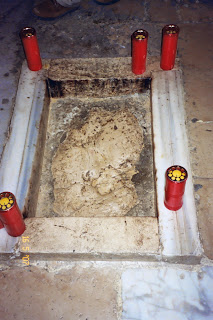Twenty-Third Sunday in Ordinary Time
In humility we must acknowledge that we do not always know why God does what He does, nor do we always find an answer on this side of eternity. Even if we did sit down and drink a beer with Jesus, there would probably be some things that He didn’t tell us, or He’d tell us not to worry about certain things because we don’t need to know some things, even when we think we do.
But God has a plan, and He calls us to trust Him that His plan will bring about the best result. This is where faith comes in, where we go along with God and His ways, even when we can’t make out how it makes sense. And while God sometimes asks us simply to trust, He proves Himself worthy of that trust by what He did for us.
It would be odd for God to tell us that we have to take up our cross and follow Him, unless He took up His cross and followed the will of God, even when it meant extreme suffering and death. And He proved, by His Resurrection, that though following God and trusting in His plan can mean great anguish, that anguish passes and a joy and life beyond all imagining follows.
So many people will ask the question, “Why does a good God allow good people to suffer?” Or, “How can there be evil in the world if God is good?” The only answer we have is that free will, which allows us to love God, also allows us to disobey God and cause great pain and suffering to others. Robots and pets cannot truly love because they cannot truly choose. And a person feeling affection for us without having a choice doesn’t feel good at all or affirm that it is good that we exist. To use a very recent and probably still raw example, the same free will which allows a very confused man to shoot at a school Mass in Minneapolis, also allows a student to lay on top of his younger schoolmate so that any bullets don’t hit the younger student. “Greater love has no man than this, to lay down his life for his friend.” But love can only exist where free will exists.
But rather than asking why evil exists, for us as Catholics I would argue we gain more by asking what God does with suffering. What does God do in the face of the cross? He endures it with us. He shows us that He will never abandon us when the going gets tough. Where was God in Minneapolis? He was with the students, giving some courage to put their own lives on the line, even though they can’t even drive a car or vote. He was present with the teachers, helping them to use their training and give instructions and provide as much calm as they could so that their students could be as safe as possible. He was there with the students who died, mourning that their lives had to be cut so short and that a person would misuse free will in such a way as to bring unbearable pain and sorrow to the families who now bury their children. He was there with the parents, wondering if their child was alive or mourning the loss of their own flesh and blood. Never did God say that the suffering was too much for Him to remain. Never did God shy away from that pain and heartache. He was there, on His cross, suffering in Minneapolis as He suffered on Calvary for the salvation of the world.
And just as Christ brought the Resurrection from all the evil, hate, and sin that was thrown at Him on the cross, so He will bring a resurrection from Minneapolis and from every evil that happens at every moment in every place around the world. Somehow, God will cause greater good, not at the expense of the innocent, but transforming a privation of good, that which we call evil, into an overflowing of good, so that even though evil thinks it wins, it ends up in defeat, no matter what evil does or how hard it strives to find victory. As St. Paul says elsewhere, “Where, O death, is your victory?”
And the fact that God brings good out of evil should cause us consolation, because we, all too often, perpetrate evil. We, all too often, misuse our free will in private or in public, but because all sin is communal, we weaken the entire Body of Christ by our rejection of God, no matter how big or how little a sin we commit. But God can use our rejection of Him to bring about great goods, even if that good is simply our own conversion as we repent of our sinful deeds and turn back to the Lord to strive, by His grace, to choose good and build back up the Body of Christ.
Certainly, it would be cool to have a beer, or bourbon, with Jesus. We would likely have some questions which Jesus may or may not answer, not to hide stuff, but because we really don’t need to know. But what we do know is God’s love for us, because He proved it on the cross, and makes present in an unbloody manner that same sacrifice as we celebrate this Mass. May our worthy reception of Holy Communion strengthen us in choosing the good, and strengthen our trust in God’s plan, even when it seems so mysterious to us.




















